Why startups should choose decentralized crypto wallets
First things first, what is a decentralized crypto wallet? A crypto wallet decentralized, also known as a non-custodial wallet, enables users to maintain complete control over their private keys and digital assets. Unlike centralized wallets that rely on third parties, these wallets empower users to interact directly with cryptocurrencies and decentralized applications (dApps).
Startups should consider integrating or developing decentralized wallets for the following main reasons:
- Enhanced security: Users retain control over their private keys, significantly reducing the risk of hacks and unauthorized access. Leading wallet like MetaMask, Trust Wallet, and Ledger Nano S/X offer features such as multi-signature support, seed phrase backup, and cold storage for added protection.
- User autonomy: With over 320 million cryptocurrency users worldwide, many prefer self-custody wallets for independence. By integrating decentralized wallets, startups can attract users who value control and privacy.
- Ecosystem integration: Decentralized wallets enable seamless interaction with DeFi applications (e.g., Uniswap, Aave), NFT marketplace (e.g., OpenSea), and staking platforms. Startups can enhance product utility and reach a broader audience by supporting multiple blockchain networks like Ethereum, Binance Smart Chain, Polygon, or Solana.
- Bussiness benefits: Offering a user-friendly decentralized wallet can increase revenue through transaction fees while building trust and credibility. Startups that prioritize security and usability strengthen their reputation and attract long-term users.
Given these reasons, it is no surprise that the demand for decentralized crypto wallets is surging. More specifically:
- The DeFi market now exceeds $26.94 billion to $32.36 billion, relfecting a strong demand for self-custody solutions.
- Over 20 million unique addresses actively engage with DeFi apps, signaling a growing user base for decentralized wallets.
- Platforms like Uniswap V3 receive millions of monthly visits, highlighting the popularity of ecosystems that rely on decentralized wallets.
Top 10 best decentralized crypto wallets in 2026
This table provides a comprehensive overview of what is the best decentralized crypto wallet with their characteristics. It allows you to compare them effectively as you consider your options in the decentralized crypto space.
| Name | Fee | Wallet types | Numbers of cryptos supported |
|---|---|---|---|
| Meta Mask | 0.875% (built into the exchange rate) | Hot wallet | 500,000+ |
| Trust wallet | No fees for sending; variable for swaps | Hot wallet | 200+ |
| Ledger Nano S | Commission built into the exchange rate | Cold wallet | 5,500+ |
| Exodus | Varies by currency and 3rd party | Hot wallet | 300+ |
| Trezor Model One | Approximately 4.5% to 6%, depending on the selected provider and cryptocurrency | Cold wallet | 1,200+ |
| Atomic Wallet | No extra fees for transactions, but swap fees apply | Hot wallet | 300+ |
| Margex wallet | Market makers pay a 0.019% fee, while market takers are charged 0.06% | Cold wallet | 100+ |
| Uniswap wallet | The swapping fee is 0.3%, with a potential future fee of 0.05% for liquidity providers only | Hot wallet | 1,800+ |
| Zengo | No fees for receiving or sending crypto. Offers discounts for Pro customers. Applies varying fees for transactions. | Hot wallet | 120+ |
| Tangem | No wallet fees, only blockchain network and third-party service fees apply. | Cold wallet | 16,000+ |
Following the overview of the top decentralized crypto wallets, we will now provide a detailed assessment of these ten wallets. With it, you can make a more informed decision based on your specific needs and preferences.
1. Meta Mask – top Ethereum-focused decentralized wallet
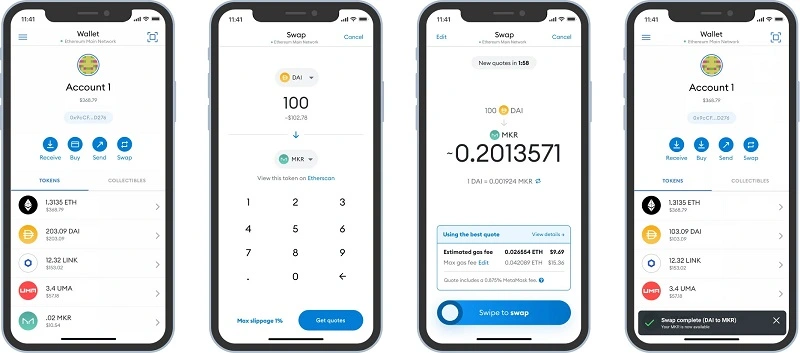
MetaMask is one of the most widely used decentralized crypto wallets, with over 30 million users worldwide. Primarily focused on Ethereum and ERC-20 tokens, it is available as both a mobile app and browser extension, enabling users to buy, sell, swap, and stake cryptocurrencies. Its built-in token swap allows trades without relying on centralized exchanges.
Pros:
- Large user base & trusted: 30M+ global users provide social proof and reliability.
- User-friendly (Browser & Mobile): Easy onboarding for new users and convenient multi-device access.
- Ethereum & ERC-20 support: Full compatibility with Ethereum mainet, Layer-2 solutions like Arbitrum and Optimism, enabling scalable transactions.
- Full support for Ethereum & ERC-20 tokens
- Direct dApp, DeFi & NFT access: Seamless integration with popular platforms such as Uniswap, Aave, OpenSea, and other Ethereum-based applications.
- Built-in token swap & staking: user can swap tokens and participate in staking without leaving the wallet interface, enhancing engagement and retention.
Cons:
- Limited mainly to Ethereum/Layer-2 chains, reducing flexibility for multi-chain users.
- High Ethereum gas fees
- Phishing & Security risks for new users: beginners may fall victim to phishing attacks if not careful with seed phrases.
- Extension performance: browser extension can be heavy at times, affecting UX on older devices.
What can you learn from them?
- Integration strategy: MetaMask is ideal for startups building Ethereum-based dApps, DeFi protocols, or NFT marketplaces, providing users immediate access to the ecosystem.
- User education: Consider implementing guides or onboarding tips to mitigate phishing risks and reduce friction for new users.
- Transaction management: For products requiring frequent micro-transactions, explore Layer-2 support (Arbitrum, Optimism) to minimize fees and improve user experience.
2. Trust wallet – user-friendly feature-rich crypto wallet decentralized
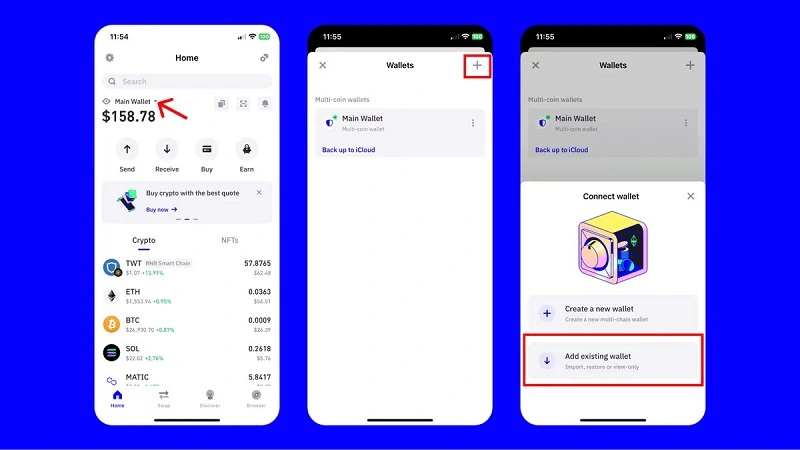
With over 60 million users, Trust Wallet allows individuals to securely store and manage 200+ cryptocurrencies and millions of tokens across more than 70 blockchains. It is non-custodial, giving users full control of their assets via a 12-word recovery phrase. Available as a mobile app and Chrome extension, Trust Wallet allows seamless buying, swapping, and staking of cryptocurrencies, with smooth integration into the Binance ecosystem.
Pros:
- Wide cryptocurrency support: Supports 200+ cryptocurrencies & millions of tokens across 70+ blockchains.
- Non-custodial security: Users fully control private keys via recovery phrases.
- Large user base: 60M+ users worldwide, strong trust & adoption
- Built-in features: Staking, token swap, and Web3 browser enable seamless interaction with dApps.
- Binance ecosystem integration: Smooth connection with Binance DeFi and token services.
Cons:
- Limited desktop support (mostly mobile app)
- Customer support delays: Response times can be slow
- Fewer advanced DeFi tools: Compared to MetaMask, lacks some advanced DeFi features.
- Performance issues: Large portfolios may cause occasional app slowdowns.
What can you learn from them?
- Multi-Currency Support: Key for user retention across diverse digital assets.
- Privacy & Security: Non-custodial control enhances trust.
- Integration: Leverage ecosystem partnerships (e.g., Binance) to boost utility and adoption
3. Ledger Nano S – secure offline self-custody wallet
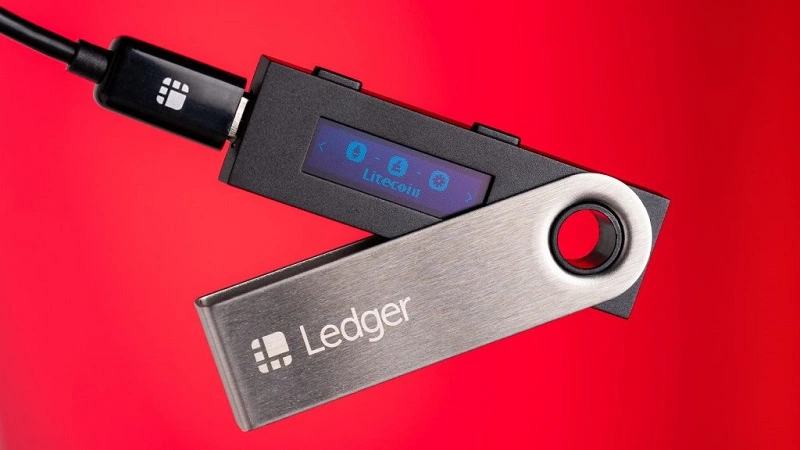
The Ledger Nano S is a lightweight and secure hardware wallet from Ledger, a leading manufacturer in crypto space. Priced around $79-$89, it supports over 5,500 cryptocurrencies, including Bitcoin (BTC), Ethereum (ETH), Solana (SOL). Users can install up to 100 applications simultaneously, with private keys stored offline for maximum protection. The wallet also integrations with the Ledger Live app, enabling staking and conventient mobile asset management.
Pros:
- Cold storage security: Hardware-based offline storage protects against hacks, malware, and phishing.
- Wide asset support: 5,500+ cryptocurrencies and NFTs across multiple blockchains.
- Ledger live integration: Manage assets, stake tokens, and track portfolio via mobile or desktop.
- Works with 50+ third-party wallets + mobile app
- User-friendly setup: intuitive onboarding and recovery process for non-technical users.
Cons:
- Limited storage capacity (can’t hold many apps at once)
- Requires physical device for transactions
- Less convenient for active traders: Slower than hot wallets for frequent transactions
- Initial cost higher than software wallets
What can you learn from them?
- Security First: Cold storage builds strong trust with security-focused users.
- Multi-Asset Support: Broad compatibility attracts diverse investors.
- Ecosystem Integration: Companion apps (e.g., Ledger Live) improve UX and retention.
4. Exodus – popular secure decentralized wallet with built-in exchange
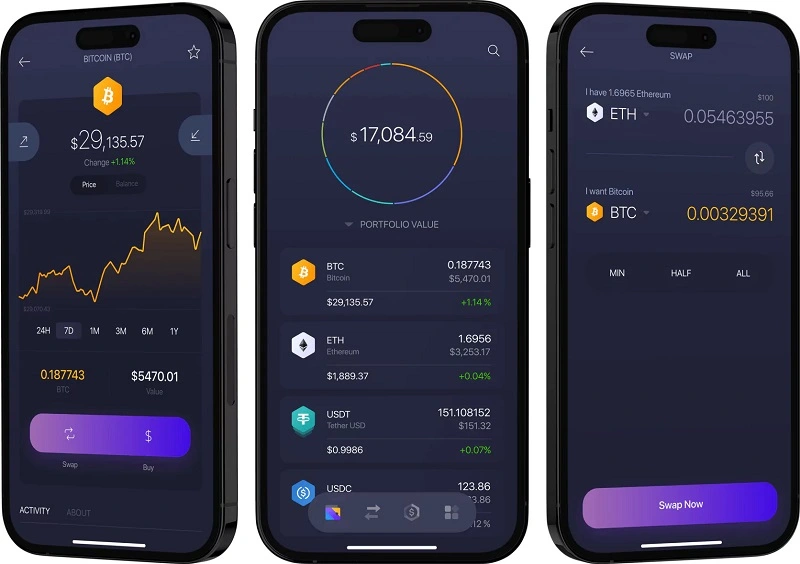
Exodus is a highly user-friendly decentralized wallets supporting 300+ cryptocurrencies, allowing asset management and swaps without KYC verification. Available on desktop and mobile, it offers staking for assets like Cardano (ADA) and Solana (SOL) and can be paired with a Trezor wallet for enhanced security. While Exodus lacks two-factor authentication (2FA), it compensates with a straightforward recovery process and 24/7 in-app customer support, making it a strong choice for both beginners and advanced users.
Pros:
- Wide crypto support: 300+ cryptocurrencies across multiple chains.
- Built-in exchange: Instant swaps without requiring third-party platforms or KYC.
- User-friendly interface, great for beginners
- Desktop & mobile compatibility
- 24/7 in-app customer support
Cons:
- Closed-source software (less transparency)
- Higher swap fees: Built-in exchange fees are higher than external DEXs
- Limited DeFi features: Lacks advanced tools like yield farming or liquidity pools
- Non-custodial, but less secure than hardware wallets
What can you learn from them?
- All-in-One Experience: Built-in exchange + multi-asset support boosts retention.
- Privacy as a Feature: No KYC helps attract privacy-conscious users.
- Hybrid Security: Pairing with hardware wallets adds value for advanced users.
5. Trezor Model One – affordable beginner-friendly wallet

Trezor Model One, priced at around $69-$70, is one of the most affordable hardware wallets for cryptocurrency security. It features a 50-digit PIN system and offline cold storage, ensuring strong protection against hacks and malware. Supporting over 1,200 cryptocurrencies, it allows users to buy, sell, and swap assets through the Trezor Suite app. Its compact design and user-friendly interface make it great for beginners, providing excellent value and security in the cryptocurrency space.
Pros:
- Strong cold storage security: Hardware-based offline protection against hacks.
- Affordable price, great for beginners
- Supports 1,000+ cryptocurrencies
- Simple interface & easy setup
- Open-source firmware for transparency
Cons:
- Limited coin support: Does not support certain coin like XRP or Cardano (ADA), unlike Ledger
- Device dependency: Requires physical device for all transactions
- Small display, less convenient compared to newer models.
- Fewer advanced features: Limited functionality vs Trezor Model T or Ledger Nano X.
What can you learn from them?
- Affordable Security: Lower price points can attract entry-level users.
- Transparency Matters: Open-source builds long-term trust.
- UX Balance: Simple onboarding + companion app (Trezor Suite) improves adoption.
6. Atomic Wallet – universal multi-currency wallet
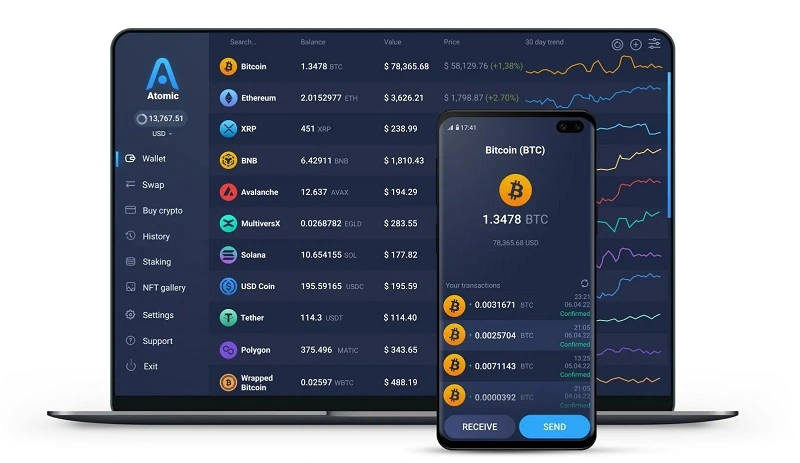
Atomic Wallet is a non-custodial, multi-currency wallet supporting over 1,000 cryptocurrencies (including Bitcoin, Ethereum, Cardano, Solana, Polkadot). It combines secure storage with an integrated exchange function, enabling atomic swaps and third-party integrations with ShapeShift and Changelly. Users can also purchase cryptocurrencies like BTC and ETH directly with a bank card. Available on both desktop and mobile, it offers staking for multiple coins, making it suitable for users managing diverse assets.
Pros:
- Supports 1,000+ cryptocurrencies in one wallet
- Built-in Atomic Swap & exchange feature
- Non-custodial: users keep full control of private keys
- Staking option: Multiple coins supported for passive income
- Cross-platform: Desktop + mobile compatibility enhances accessibility.
Cons:
- Closed-source software: less transparency compared to open-source wallets.
- Past security breach raised trust concerns
- Limited customer support options
- Higher swap fees than external exchanges
What can you learn from them?
- Cross-Platform UX: Accessibility on both desktop & mobile retains users.
- Security First: Past breaches show the need for transparent, robust security.
- Integrated Utility: Built-in swaps, staking, and fiat on-ramps increase engagement.
7. Margex Wallet – advanced trading crypto wallet
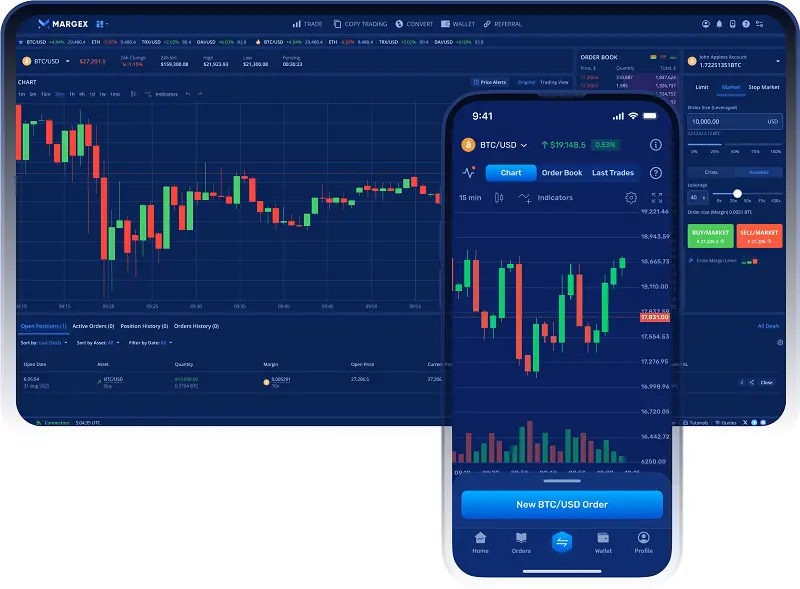
Margex wallet is a hybrid decentralized wallet integrated with the Margex exchange, designed for traders who want storage and advanced trading tools in one place. It supports multiple cryptocurrencies and enables leverage trading up to 100x. To reduce risks, Margex implements strong security measures such as multi-signature cold storage, SSL encryption, and two-factor authentication.
Pros:
- Integrated with Margex exchange for advanced trading
- Leverage trading up to 100x, attractive for risk-tolerant users
- Strong security with multi-signature cold storage & SSL encryption
- Supports BTC, ETH, USDT, and other major cryptocurrencies
- Combines trading & wallet management in one interface
Cons:
- Primarily tied to the Margex platform (less versatile than standalone wallets)
- Not fully decentralized, exchange-dependent
- Limited DeFi/NFT integrations
- High risk for inexperienced users due to leverage trading
What can you learn from them?
- Combine wallet + trading features to boost user retention
- Prioritize security-first design (multisig, encryption, cold storage)
- Target niche users (e.g., active traders & risk-tolerant investors) instead of mass-market wallets
8. Uniswap Wallet – secure decentralized wallet for Uniswap DEX
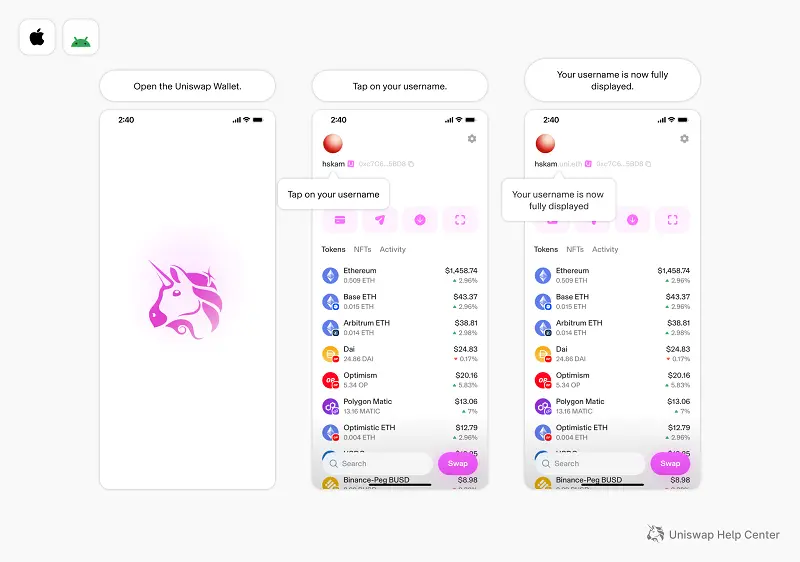
The Uniswap wallet, developed by Uniswap, is a non-custodial wallet built to integrate seamlessly with the Uniswap decentralized exchange (DEX). It supports Ethereum, ERC-20 tokens, and Layer-2 networks like Optimism and Arbitrum. Users can securely manage their assets with private key control and recovery via iCloud backup or seed phrase. Its built-in swap feature enables fast, low-slippage trades without relying on centralized intermediaries.
Best for: DeFi enthusiasts and active traders managing Ethereum-based assets.
Pros:
- Native wallet for Uniswap DEX, ideal for DeFi users
- Non-custodial: full control of private keys
- Supports Ethereum, ERC-20, and Layer-2 networks
- Built-in token swaps with low slippage
- Simple, beginner-friendly interface on mobile
Cons:
- Limited mainly to Ethereum ecosystem (no multi-chain support yet)
- No hardware wallet integration
- Lacks advanced portfolio management tools
- High Ethereum gas fees during peak usage
What can you learn from them?
- Seamless integration with a core ecosystem product (like DEX) enhances stickiness
- Mobile-first, UX-focused design improves adoption
- Adding cross-chain support + reward mechanics (e.g., Swap-to-Earn) can drive engagement
9. Zengo – multi-chain wallet using MPC to eliminate seed phrases
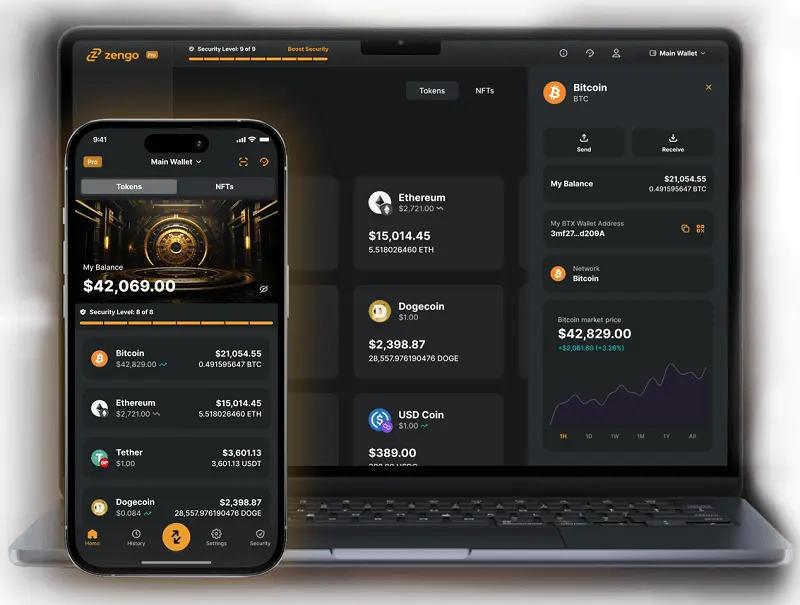
Founded in 2008, Zengo Wallet introduces a unique approach to crypto security by replacing traditional seed phrases with multi-party computation (MPC) technology. Instead of a single private key, MVP divides key management across multiple parties, reducing single points of failure. Users authenticate with 3D facial recognition, email, and a recovery file, ensuring strong yet user-friendly protection. Serving 1M+ users worldwide, Zengo supports Bitcoin, Ethereum, Polygon, and more, while offering built-in staking, DeFi, and NFT support. Remarkably, it has never been hacked since launch.
Best for: Users seeking secure, easy cryptocurrency management without seed phrases.
Pros:
- No seed phrase: uses MPC for secure keyless recovery
- Multi-chain support (Bitcoin, Ethereum, Polygon, etc.)
- Biometric login for quick, user-friendly access
- Built-in staking, DeFi, and NFT support
- 24/7 in-app customer support
Cons:
- Custody depends on Zengo’s MPC setup (not fully hardware-isolated)
- Limited advanced DeFi integrations vs. MetaMask
- Requires internet connection for full functionality
- Mobile-only (no desktop version yet)
What can you learn from them?
- Innovate security models (e.g., MPC instead of seed phrases) to reduce friction
- User-friendly onboarding (biometric login, keyless recovery) boosts adoption
- Explore subscription-based services for sustainable revenue
10. Tangem – card-based hardware wallet with tap-to-pay convenience
Tangem Wallet is a unique hardware wallet designed like a bank card, making crypto storage as simple as tapping your card. Launched in 2017 and now serving over 1M users globally, Tangem focuses on ease of use, portability, and cold storage security. Each card generates and stores private keys directly on the chip, protected against tampering and hacking. Tangem supports Bitcoin, Ethereum, Polygon, XRP, and 6,000+ tokens across major blockchains. Unlike traditional hardware wallets that rely on USB, Tangem uses NFC tap-to-pay functionality, enabling quick transactions via its mobile app.
Best for: Everyday crypto users who want secure, portable, and easy-to-use cold storage.
Pros:
- Card-based hardware wallet with NFC tap-to-pay
- Supports 6,000+ tokens & 30+ blockchains
- No seed phrase setup, private keys generated on-chip
- Durable, tamper-resistant design (certified EAL6+)
- Affordable price (~$50–$70 per card)
Cons:
- Mobile-only (requires NFC smartphone)
- Limited advanced DeFi/NFT integrations
- Dependence on Tangem’s chip manufacturing raises trust questions
- Less flexibility than Ledger/Trezor for power users
What can you learn from them?
- Innovative form factor (card-style wallet) can lower entry barriers for mainstream adoption
- Eliminating seed phrases simplifies onboarding & improves UX
- Affordable, mass-market hardware solutions can capture emerging retail audiences
Integrating crypto wallets or building a new one – What are the differences?
To compare the integration of existing wallets versus building a new decentralized wallet, you should consider the benefits and challenges associated with each approach. Below is a summary table outlining these aspects, along with related recommendations.
| Aspect | Integration of Existing Wallets | Building a New Wallet |
|---|---|---|
| Benefits | Quick deployment and reduced development time | Tailored features to meet specific user needs |
| Access to established user bases and trust | Full control over security and user data | |
| Lower initial costs | Unique branding and competitive differentiation | |
| Challenges | Limited customization options | Higher development costs and longer time to market |
| Dependence on third-party services | Requires ongoing maintenance and updates | |
| Potential security vulnerabilities from third-party integration | Need for robust security measures from scratch | |
| Recommendations | Startups with limited resources may benefit from integration | Larger startups or those with niche markets should consider building their own wallet |
Pro tip: When deciding to build new decentralized crypto wallets for competitive advantage, startups should consider:
- Market gaps: Tailored wallets can attract users if existing options lack essential features.
- Unique value proposition: Standout features like enhanced security can differentiate the wallet.
- User experience: Intuitive design can draw users from wallets with poor interfaces.
- Adaptability: Custom wallets allow quick adjustments to changing trends and new features.
- Brand identity: This wallet fosters customer loyalty and aligns with the startup’s values.
- Long-term strategy: Building a wallet supports broader goals for growth in the cryptocurrency ecosystem.
Synodus – Your trusted partner in decentralized crypto wallet development
Synodus is one of the top-rated partners specializing in the development of the best decentralized crypto wallets, with extensive experience in blockchain projects. The company offers a comprehensive suite of services, including DApp development, DeFi solutions, NFT development, and crypto wallet integration into existing ecosystems.
Our expertise through successful case study
Overview: Synodus integrated a decentralized crypto wallet into the DeFi For You platform, allowing users to manage transactions without switching between multiple applications like MetaMask. This integration streamlined actions such as signing, fund approval, and transactions.
Key results:
- Project duration: 7 months
- Team size: 20 professionals
- Technical stack: Utilized Ethereum, Binance Smart Chain, Solidity, Flutter, iOS, Android, and TrustWallet Core.
- Security enhancements: Implemented robust encryption and secure storage of private keys.
- Interoperability achievements: Successfully integrated with major wallet standards and multiple blockchain networks.
- User experience improvement: Developed an intuitive interface that facilitated easy account management and seamless transactions.
Unique offerings for startups
Synodus provides competitive pricing for its services, ranging from $16 to $30 per hour, making it an attractive option for startups looking to develop decentralized wallets for crypto.
We also offer tailored packages for crypto startups, including the Funding Kickstart Package, Project Scope Blueprints, and Custom MVP Development, to streamline product launches. These packages address early-stage challenges by providing essential financial support, clear project planning, and rapid MVP development. This structured approach accelerates time-to-market, enhances market presence, and boosts growth potential.
Want to integrate or build a decentralized crypto wallet?
Conclusion
Decentralized crypto wallets are more than just a tool—they’re a gateway to innovation, user empowerment, and security in the ever-growing crypto space.
For startups, the choice to integrate or build a wallet isn’t just about technology; it’s about shaping a product that trully resonates with users and stands the test of time.
The top 10 decentralized crypto wallets have provided you with a deeper understanding of their features, the benefits they offer users, and valuable lessons you can apply if you decide to build your own wallet.
Remember, success lies in choosing the right partner and strategy to bring your idea to life. With the right tools and support, your journey to success in the decentralized world is within reach.
FAQs
Some of the best options in 2026 include MetaMask, Trust Wallet, Coinbase Wallet, and Tangem, depending on your needs for DeFi, NFTs, or multi-chain support.
Yes, they’re free to download and use, but you still pay network gas fees for sending or swapping tokens.
Yes. Wallets like MetaMask, Trust Wallet, and Coinbase Wallet let you store, view, and transfer NFTs easily.
The main risks are losing your private keys, phishing scams, and malicious contracts. With no central recovery, security is entirely your responsibility.
Yes. MetaMask is a non-custodial wallet, giving you full control of your keys and direct access to dApps and blockchains.
How useful was this post?
Click on a star to rate it!
Average rating / 5. Vote count:
No votes so far! Be the first to rate this post.




